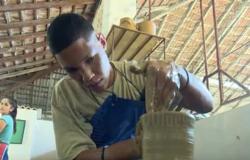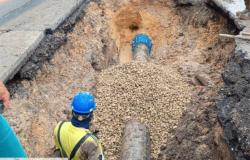In parallel with the imminent vote in favor of the “RIGI” (incentive regime for large investments) by the Senator representing the provincial ruling party, the government surreptitiously incorporates into educational establishments a textbook intended for 5th grade students, with the clear intention of provoking citizen support towards the metal extractive industry, via public schools.
The manual edited by the Ministry of Education of Río Negro itself is called, “Finding ourselves in Río Negro, a trip through our province.”
According to the words of Representative Agustín Domingo – who has just voted for the RIGI in the Lower House, the new regime “is a step towards clear and predictable rules for large investments.”
The necessary question is, what was Representative Domingo referring to when he talked about large investors? Evidently he was referring – among others – to the foreign mining corporations that for more than 20 years have been flying over virgin soil exploiting gold, silver, uranium and lithium like birds of prey, such as the southern region, the Meseta protected natural area. of Somuncura, Bajo Santa Rosa and the Andes mountain range.
Let us remember that after the repeal of the so-called anti-cyanide law (of whose first text entered into the Legislature I was the author), Río Negro was at the mercy of those “investors” who could not – until now – sink their claws into our territory, simply because his people chose to defend the water.
The scarcity of water and the consequent human right to access it – which determined the declaration of water emergencies in the southern region on repeated occasions – as well as the complaints about the destruction of environmental and cultural heritage, adding to the looting for insignificant royalties and foreign currency that were liquidated abroad without leaving anything in the territory from where the mineral is extracted, were some of the reasons for the brakes that the Rio Negro people themselves put in place to avoid the extractive metal industry, which has already garnered several “NO” in sister provinces such as Mendoza and Chubut.
Today we are experiencing a new outpost in Río Negro of the large mining corporations that will benefit ridiculously from the RIGI, to the detriment of national SMEs and the people as a whole.
This, undoubtedly, goes hand in hand with the growing and renewed process of foreignization of lands: A whole oiled mechanism of which the Superior Court of Justice itself is a part with the recent ruling that annulled a ruling by a First Instance Judge that guaranteed the right failed to comply with free, prior and informed consultation with indigenous communities and suspended the large mining industry in the southern province.
The truth is that the strategy spreads like a virus created in offices that resemble laboratories closed in the eyes of the population. The promotion of pro-extrativism university courses, the appearance of new Techniques in the matter, the diverse delegations of officials who travel to participate in lavish international mining fairs, are proof of this.
From now on, Rio Negro boys and girls must study, on a mandatory basis, the “goodness” of an extractive activity that has been rejected by citizens mobilized in streets, squares and churches throughout the province during the last two decades.
In my capacity as provincial legislator, I request the withdrawal of the 5th grade study manuals from the Educational Establishments of Río Negro, in respect of the rights of boys and girls incorporated in “The Convention on the Rights of the Child” (art. 28), in addition to the rights of education workers and the entire educational community.
The debate on the provincial productive matrix must be the result of a participatory process – without exclusions – where information on the social and environmental impact that its modification implies is absolutely guaranteed.
No boy or girl can be a prisoner of government or business strategies with interests that are not precisely the interests of the country.
Magdalena Odarda
Provincial deputy of the Vamos con Todo block.






